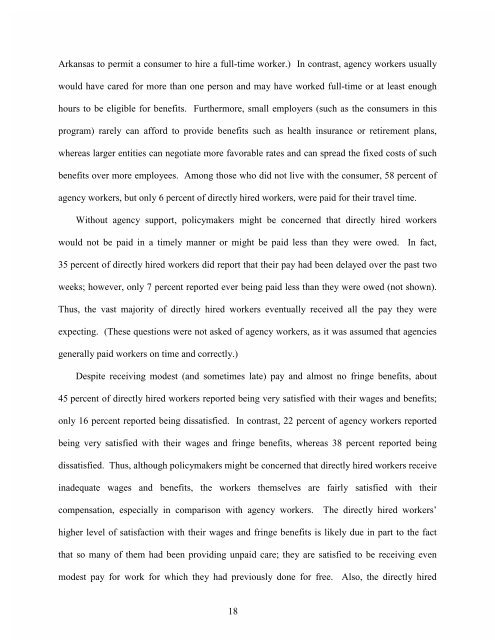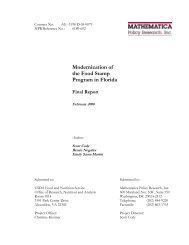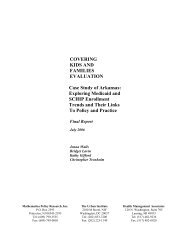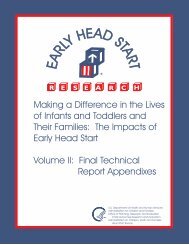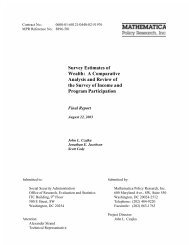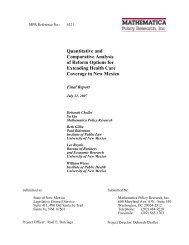The Experiences of Workers Hired Under Consumer Direction in ...
The Experiences of Workers Hired Under Consumer Direction in ...
The Experiences of Workers Hired Under Consumer Direction in ...
You also want an ePaper? Increase the reach of your titles
YUMPU automatically turns print PDFs into web optimized ePapers that Google loves.
Arkansas to permit a consumer to hire a full-time worker.) In contrast, agency workers usuallywould have cared for more than one person and may have worked full-time or at least enoughhours to be eligible for benefits. Furthermore, small employers (such as the consumers <strong>in</strong> thisprogram) rarely can afford to provide benefits such as health <strong>in</strong>surance or retirement plans,whereas larger entities can negotiate more favorable rates and can spread the fixed costs <strong>of</strong> suchbenefits over more employees. Among those who did not live with the consumer, 58 percent <strong>of</strong>agency workers, but only 6 percent <strong>of</strong> directly hired workers, were paid for their travel time.Without agency support, policymakers might be concerned that directly hired workerswould not be paid <strong>in</strong> a timely manner or might be paid less than they were owed. In fact,35 percent <strong>of</strong> directly hired workers did report that their pay had been delayed over the past twoweeks; however, only 7 percent reported ever be<strong>in</strong>g paid less than they were owed (not shown).Thus, the vast majority <strong>of</strong> directly hired workers eventually received all the pay they wereexpect<strong>in</strong>g. (<strong>The</strong>se questions were not asked <strong>of</strong> agency workers, as it was assumed that agenciesgenerally paid workers on time and correctly.)Despite receiv<strong>in</strong>g modest (and sometimes late) pay and almost no fr<strong>in</strong>ge benefits, about45 percent <strong>of</strong> directly hired workers reported be<strong>in</strong>g very satisfied with their wages and benefits;only 16 percent reported be<strong>in</strong>g dissatisfied. In contrast, 22 percent <strong>of</strong> agency workers reportedbe<strong>in</strong>g very satisfied with their wages and fr<strong>in</strong>ge benefits, whereas 38 percent reported be<strong>in</strong>gdissatisfied. Thus, although policymakers might be concerned that directly hired workers receive<strong>in</strong>adequate wages and benefits, the workers themselves are fairly satisfied with theircompensation, especially <strong>in</strong> comparison with agency workers. <strong>The</strong> directly hired workers’higher level <strong>of</strong> satisfaction with their wages and fr<strong>in</strong>ge benefits is likely due <strong>in</strong> part to the factthat so many <strong>of</strong> them had been provid<strong>in</strong>g unpaid care; they are satisfied to be receiv<strong>in</strong>g evenmodest pay for work for which they had previously done for free. Also, the directly hired18


